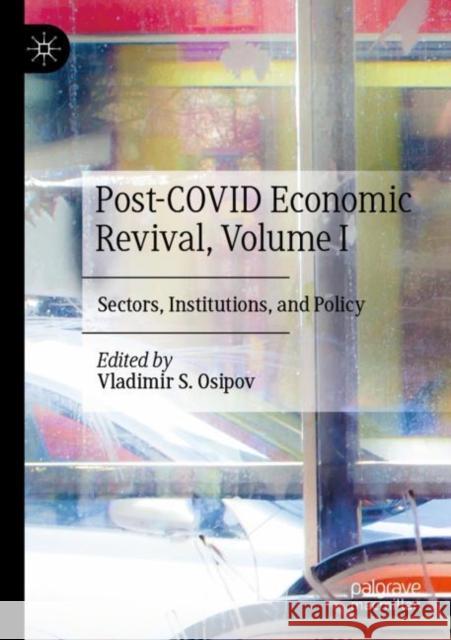Post-COVID Economic Revival, Volume I: Sectors, Institutions, and Policy » książka
Post-COVID Economic Revival, Volume I: Sectors, Institutions, and Policy
ISBN-13: 9783030835637 / Angielski / Miękka / 2022 / 398 str.
Post-COVID Economic Revival, Volume I: Sectors, Institutions, and Policy
ISBN-13: 9783030835637 / Angielski / Miękka / 2022 / 398 str.
(netto: 611,96 VAT: 5%)
Najniższa cena z 30 dni: 616,85
ok. 16-18 dni roboczych.
Darmowa dostawa!
This two-volume book examines the most important global problem—the recovery of the social-economic crises due to the COVID-19 pandemic. This economic crisis has its own basis and differs from others by the lockdown of most businesses on the decision of authorities. The uncertainty of the future economic revival obliges scientists around the world to unite in search of effective solutions that will become the basis for prosperity and human wellbeing.The death of millions of people around the world, several waves of coronavirus, and a global pandemic have forced most states to seek extraordinary measures to save people and revive economic activity. The world economy experienced a global shock, probably never experienced before due to lockdowns. The disruptions and gaps in the value chains were primarily caused by the lockdowns of enterprises. The change in the essence of the economic crisis has raised the question of how to overcome it and revive economic activity. The crisis caused a sharp decline in incomes of the population around the world, which led to social upheavals. Post-COVID economic revival in a globalized world has become the most important problem of our time. This book offers contributions of authors from different countries and explores problem solving in the fields of public administration (Volume I, Part I), financial services (Volume I, Part II), different branches (Volume II, Part III) and the social sector (Volume II, Part IV).The first volume discusses governmentality, public, and corporate management. The second part of the volume reveals the trends in the development of the financial sector in the post-COVID period. Despite the fact that the book is divided into two volumes and four parts, a holistic and systematic perception of the new reality of the post-COVID age can be obtained by reading the entire book.This book will be of interest to academics and practitioners in public administration and economics, particularly those who are interested in Post-COVID economic revival.
This two-volume book examines the most important global problem—the recovery of the social-economic crises due to the COVID-19 pandemic. This economic crisis has its own basis and differs from others by the lockdown of most businesses on the decision of authorities. The uncertainty of the future economic revival obliges scientists around the world to unite in search of effective solutions that will become the basis for prosperity and human wellbeing.The death of millions of people around the world, several waves of coronavirus, and a global pandemic have forced most states to seek extraordinary measures to save people and revive economic activity. The world economy experienced a global shock, probably never experienced before due to lockdowns. The disruptions and gaps in the value chains were primarily caused by the lockdowns of enterprises. The change in the essence of the economic crisis has raised the question of how to overcome it and revive economic activity. The crisis caused a sharp decline in incomes of the population around the world, which led to social upheavals. Post-COVID economic revival in a globalized world has become the most important problem of our time. This book offers contributions of authors from different countries and explores problem solving in the fields of public administration (Volume I, Part I), financial services (Volume I, Part II), different branches (Volume II, Part III) and the social sector (Volume II, Part IV).The first volume discusses governmentality, public, and corporate management. The second part of the volume reveals the trends in the development of the financial sector in the post-COVID period. Despite the fact that the book is divided into two volumes and four parts, a holistic and systematic perception of the new reality of the post-COVID age can be obtained by reading the entire book. This book will be of interest to academics and practitioners in public administration and economics, particularly those who are interested in Post-COVID economic revival.











